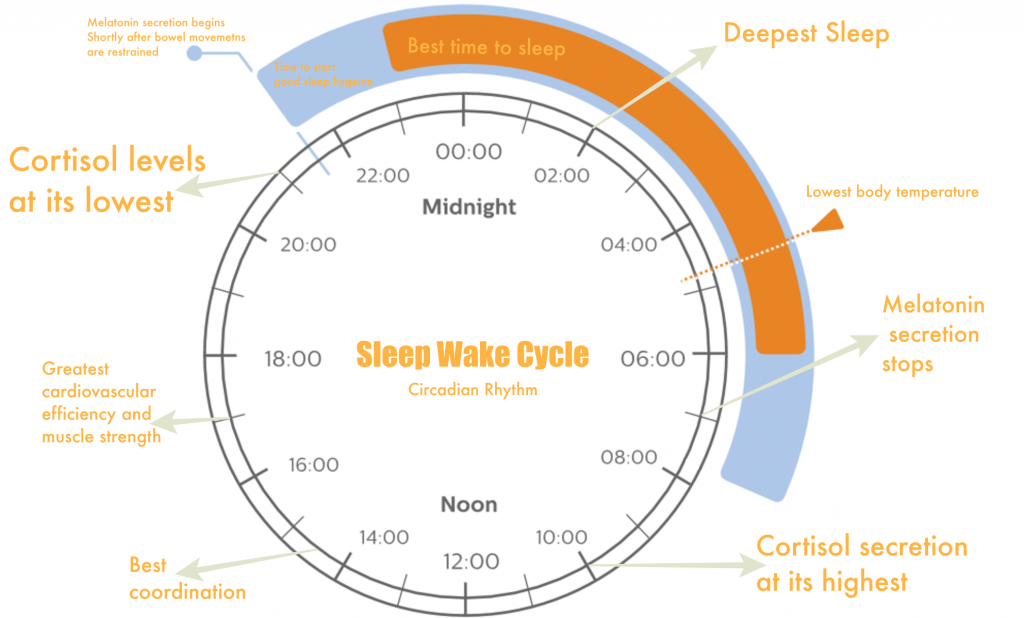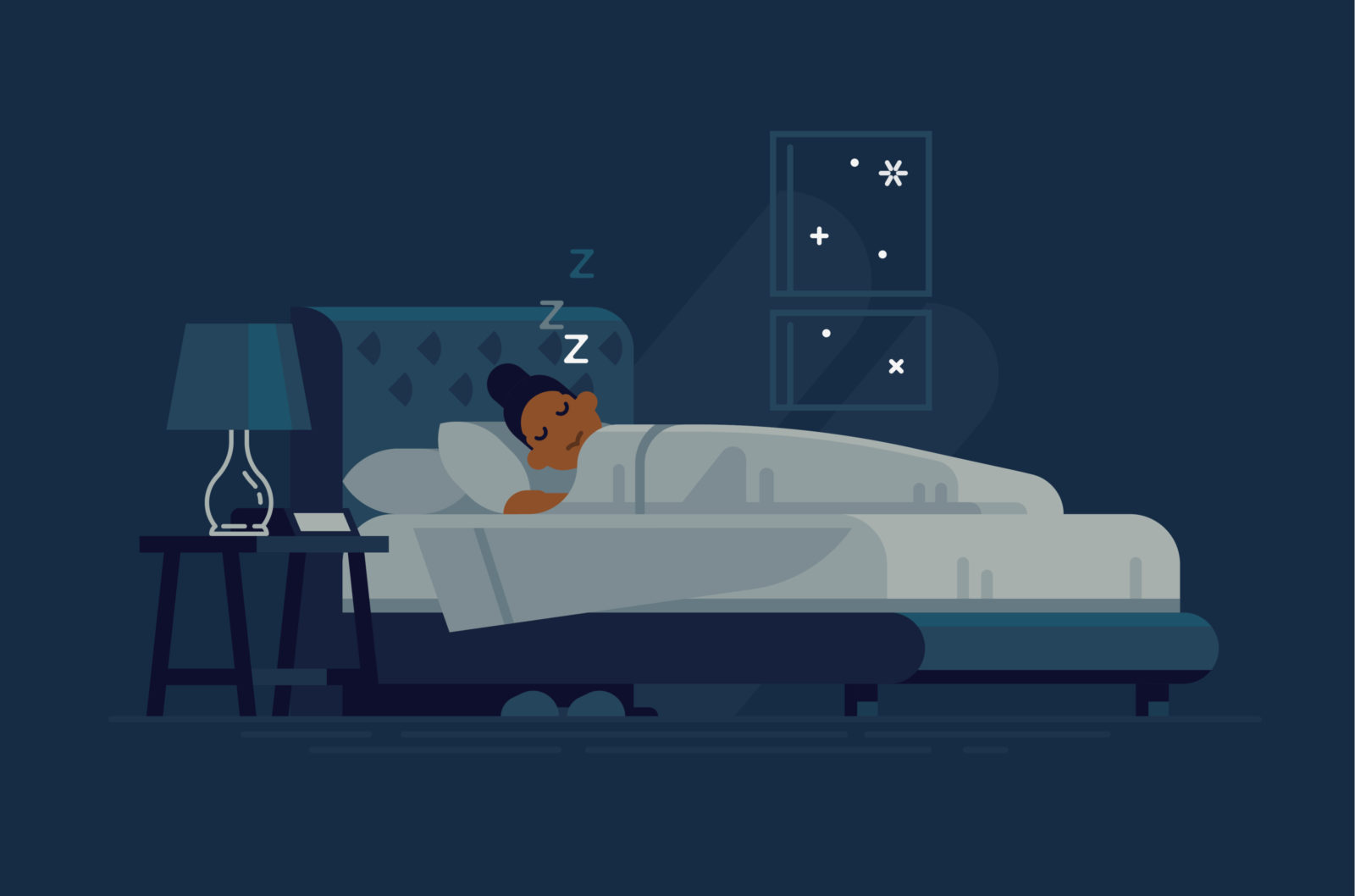Circadian Rhythm
The circadian rhythm is your sleep cycle. It is part of your body’s clock, informing you when the best time to sleep and wake is. However, like any other system in the body, it can get out of balance.
Regulated by hormones, its efficiency is controlled by the health of the body – if the body is out of balance so will hormone production and in turn, the sleep-wake cycle will not perform as it should.
Key Players That Affect Sleep
There are a few key players (hormones, neurotransmitters, and amino acids) in the circadian rhythm.
Tryptophan
An essential amino acid (meaning it cannot be produced by the body and needs to be derived from the diet), that is the precursor for serotonin. It is required for normal growth as well as balancing nitrogen levels in the body. It crosses the blood-brain barrier. Tryptophan is helpful in the treatment of depression, nightmares, headaches/migraines, fibromyalgia, and mood swings.
5-HTP
5-HTP or oxitriptan, like tryptophan, is a precursor for serotonin, however, unlike tryptophan, it is just one step away from the conversion of the hormone serotonin (and eventually melatonin). 5HTP is also helpful in the treatment of depression, nightmares, headaches/migraines, fibromyalgia, and mood swings.
Serotonin
This neurotransmitter is found within the brain, intestines, and blood of the body. It is created in the raphe nuclei – found at the midbrain. Its manufacturing begins when tectum (also in the midbrain) is stimulated by light (deficiency in serotonin often occurs during months when there is less sun – winter months, as well as if the individual in question spends a large amount of time indoors). Serotonin is a precursor for melatonin, which is the essential sleep hormone.
Melatonin
Secreted by the pineal gland located in the brain, this hormone is essential at regulating the circadian rhythm of the body. Good quality, healthy sleep is strongly dependent on the levels of melatonin in the body. Apart from balancing the sleep-wake cycle, melatonin is also essential in regulating metabolic action and behaviour as well as female reproductive health.
Melatonin is also an essential antioxidant that aids in the fight against cancer (prevention and recovery). If there any source of light in the room that an individual is sleeping in (and said the individual is not wearing an eye mask) an inadequate amount of melatonin will be produced. Over time this can become a severe issue in both depleting the immune system and depriving the body of good sleep.
Leptin
Leptin is a hormone that is responsible for the coordination and regulation of hunger, metabolism and the use of food as either fuel or fat. It controls the functioning of the hypothalamus, located in the brain, which is in charge of the body’s rhythmic activities (such as the sleep-wake cycle). When the diet is high in refined sugars, carbohydrates and bad fats (such as the Standard American Diet) leptin becomes less receptive in the brain and this disrupts many hormonal functions in the body.
Cortisol
Best known as the stress hormone, it is essential for the health and proper functioning of the body. However, when this hormone is out of balance it can cause serious problems in the body.
This steroid hormone is manufactured in the adrenal glands (when they become fatigued they can either overproduce or underproduce cortisol). Cortisol is essential for the strength, structure and functioning of bones, the nervous and immune systems, stress response as well as the breakdown and utilization of fats, carbs and protein in the body.
Norepinephrine
This neurotransmitter, which is manufactured in the adrenal glands is responsible for aiding the brain in both focus and the ability to solve problems. It is also essential for it aids in the dilation of the pupils (when it gets darker) which allows for the change of serotonin into melatonin.
When adrenals have fatigued the levels of norepinephrine are reduced. This subsequently affects the levels of melatonin and thus affects sleep quality.

Internal Balance for Good Quality Sleep
All of these hormones, neurotransmitters and amino acids need to be in perfect working order to reap the full benefits of a good night’s rest. Where does one begin in the understanding of the sleep-wake cycle? It is important to remember that healthy sleep is reliant on melatonin stores, without them, proper sleep cannot be had. Let’s look at what a good quality sleep cycle should be like.
When cortisol increases in the body, melatonin production begins to fall. Cortisol begins to slowly build up again in the body when one is asleep until it reaches its peak, which is about the time that an individual wakes up between 6 and 10 o’clock. This is why one should feel energized, refreshed and alert when they wake up in the morning (Kharrazian, D., 2013). At this point your digestive system starts turning again – you get a natural increase of ghrelin (the hunger hormone) and your heart rate increases (Greenfield, B., 2014).
Cortisol production from that point tends to taper down (if everything is functioning optimally) until it has reached its lowest point right before bedtime. At this time several amino acids, neurotransmitters, and hormones are set into gear. Norepinephrine as the day grows darker increases pupil dilation so as to allow for more light to enter into the eye. This action stimulates the conversion of serotonin into melatonin in the pineal gland (Kharrazian, D., 2013) (Dow, M., 2015). If cortisol levels are too high (as a result of stress, diet or drugs) serotonin will not be able to bind to receptors in the brain resulting in less melatonin secretion (Dow, M., 2015). Furthermore, high cortisol levels also prevent the release of growth hormone (essential for repairing the body) leading to premature aging (Holford, P., 2007).
At around midnight is when melatonin production hits its peak, and allows leptin to enter the hypothalamus – from where it stimulates the thyroid to upregulate thyroid function. This hormone is essential for metabolism and weight control among other things (Greenfield, B., 2014) (Perlmutter, D., 2013). At this time cortisol also begins to slowly rise. When one sleeps, it is cortisol’s job to break down glycogen in the liver so as to provide the body with energy in the form of glucose (Kharrazian, D., 2013). With this action, the cycle begins again, with cortisol surging around 6-10 o’clock waking the individual up and beginning a new day.

Stress, Drugs and Bad Food – Turning Back Your C.R.Clock
Think carefully about the last day that you felt truly well, a day that did not feel the strain of fatigue. If it was this morning or yesterday did you consume foods high in sugar, caffeine and other artificial stimulants? Such substances are incredibly stimulating and hide the feeling of fatigue – though you may need to constantly supply your body with such stimulants in order to get through your day (Fuhrman, J., 2011).
Stress
Stress can be unavoidable, the way one reacts to it can be. Keeping stress and angry with you will make it hard to fall asleep and keep a well-functioning sleep cycle. An hour or more before you go to bed, begin to pull away from work and begin to bring yourself into a calm state of being. Keeping stress with you increases cortisol levels in the body, this begins a long journey of unbalanced hormones and even more stress and the individual will now have to deal with being tired a great deal of the time (Greenfield, B., 2014).
Caffeine
Although caffeine may allow you to go through life with less sleep and still function as a human to some degree, it hinders deep sleep and over time the effect speeds up the ageing process and increase the production of the stress hormone cortisol (Fuhrman, J., 2011).
The negative side of caffeine
- inhibits glucose metabolism
- increases insulin resistance
- advanced heart disease problems
- promotes overeating
Sleeping Pills
Sleeping pills, such as Ambien (aka Zolpidem) are prescribed daily to aid individuals suffering from insomnia. However, they are only supposed to provide short-term treatment and do not fix the underlying issues of insomnia (Gaby, A.R., 2006). There are many side effects to taking sleeping pills, such as; hallucinations, depression, impairment of driving ability – even the morning after taking the pill, anterograde amnesia, may cause death and does not aid in rebalancing the circadian rhythm (Dow. M., 2015).
Alcohol
Alcohol places a strain on your body, particularly your liver. There may be a grey zone of okay quantity however for the most part ‘If you don’t drink, don’t start for your health’. As your body slows down during sleep and repairs are being made alcohol can have a hand in inhibiting this activity. Moreover, instead of wake up feeling great, you often wake up feeling sleepy and sluggish, perhaps even a little bit tipsy. The consumption of alcohol can also impair sleep quality often individuals either do not get enough sleep or simply not enough good quality sleep (waking up frequently at night) (Greenfield, B., 2014).
Sugar
A sudden drop in glucose levels during the night as you sleep can cause you to wake up. The feeling that one might get right after breakfast or lunch especially if that meal was high in sugar and carbs. This is an example of blood sugar imbalance and insulin insensitivity (Murray, M.T., & Pizzorno, J., 2012).
Sugar before bedtime can make it very hard to fall asleep and stay asleep. Moreover, one has the potential, when they do fall asleep to have very bad dreams. If one is already experiencing sleeping problems they are also probably experiencing cravings for sugars, sweets and carbs. It is by no means easy but by dialing back on the processed sugar and carbohydrates and filling up on good fats, fiber, protein and lots of veggies blood sugar over time can be balanced and insulin can begin to be more receptive (Gedgaudas, N.T., 2011).
References
Dow, M. (2015).The brain fog fix: reclaim your focus, memory, and joy in just 3 weeks. London: Hay House.
Fuhrman, J. M. (2003).Eat to Live. Boston: Little Brown and Company.
Gaby, A. (2006).A-Z guide to drug-herb-vitamin interactions improve your health and avoid side effects when using common medications and natural supplements together. New York: Three Rivers Press.
Gedgaudas, N. T. (2011).Primal body, primal mind: beyond the paleo diet for total health and longer life. Rochester, VT: Healing Arts Press.
Greenfield, B. (2014).Beyond training: mastering endurance, health, and life. Las Vegas: Victory Belt Publishing, Inc.
Holford, P. (2007).Optimum nutrition for the mind. London: Piatkus Books.
Kharrazian, D. (2013).Why isn’t my brain working?: a revolutionary understanding of brain decline and effective strategies to recover your brains health. Carlsbad, CA: Elephant Press.
Murray, M. T., & Pizzorno, J. E. (2014).The encyclopedia of natural medicine. London: Simon & Schuster.
Perlmutter, D. (2015).Grain brain: the surprising truth about wheat, carbs, and sugar–your brain’s silent killers. Place of publication not identified: Little Brown.
Amanda Filipowicz is a certified nutritional practitioner (CNP) with a bachelor in environmental studies (BES) from York University. She also has certification in clinical detoxification, prenatal and postnatal care as well as nutrition for mental health. She has been working as a nutritionist since 2013 and is a lifelong proponent of eating healthy.

